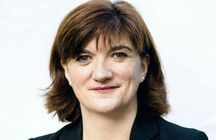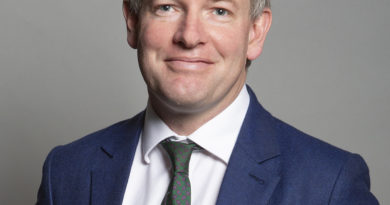Nicky Morgan – 2016 Speech on International Women’s Day
Below is the text of the speech made by Nicky Morgan, the Secretary of State for Education, at the Churchill War Rooms in London on 8 March 2016.
Thank you Alison [Stephenson – Director, Head Office MOD and the MOD Civil Service Gender Champion] for that kind introduction and good afternoon ladies and gentlemen and happy International Women’s Day.
It’s such a pleasure to be at the Cabinet War Rooms to talk to you today, and I want to thank the Ministry of Defence and my friend and colleague Penny Mordaunt for hosting this event on this special day.
I should point out that Penny is the first woman ever to hold the ministerial portfolio for the armed forces – and I’m sure that she is the first of many talented women who will take on this and other MOD roles.
I’m delighted that we are here marking International Women’s Day – and right the way across Whitehall this is a day when we take the opportunity to celebrate just how far we have come on the road to gender equality.
But it’s also an opportunity to take stock of how far we still have to travel to create an equal and inclusive society for women and girls.
Every single government department has a role to play in the fight for gender equality – not just in the UK but around the world.
My colleague Justine Greening has been putting women’s rights to the top of the agenda in the developing world and beyond.
Her commitment to, and I quote, “breaking the chains of dependency” from men is such a powerful message, especially today.
And here at the Ministry of Defence there is fantastic work going on in terms of recruitment, outreach and leadership to ensure that more women have the opportunity to enter the armed forces.
And I fully support the Prime Minister and the Defence Secretary who are united in wanting to see all roles in the armed forces opened up to women so that they can serve and protect their country in any way that they choose.
I’m looking forward to seeing the contribution that women continue to make as they shape the defence agenda more than ever before.
And I can also announce today that the government will be extending the Convention on the Elimination of All Forms of Discrimination against Women to the British overseas territories of Anguilla and the Cayman Islands.
This is a significant move with well over 35,000 women and girls expected to benefit from the standards and expectations of gender equality set out under the convention.
I’m a great believer that our responsibility for gender equality stretches beyond our own shores.
Put simply, we have a duty to protect and empower women.
The fact is, sexual violence is not about sex, it’s about power.
It’s a tactic of war, a weapon of terror used to destroy lives and fuel conflict.
Victims often find that there are no laws to protect them, no support system to help them recover, and no hope of justice.
All they have is stigma, humiliation and pain.
And we mustn’t shy away from talking about this.
As Angelina Jolie said so powerfully at the End Sexual Violence in Conflict Summit in 2014 “war zone rape is a crime that thrives on silence and denial”.
And so that’s why I welcome the government’s ongoing commitment to tackling sexual violence and in particular the commitment that by November 2016 all UK troops deployed overseas will receive training on the prevention of sexual violence.
We must continue to fight for gender equality and support women around the world, whether that’s at home in the UK or in conflict zones like Syria.
You will know better than anybody that we are fighting currently a global war against the evils of Daesh.
There is no more abhorrent an example of how some women are still treated as slaves, reduced to little more than property.
We know that women are raped and abused at will so we are right to take the fight to Daesh and to stand up for our values here and overseas of equality and justice for all.
But women and girls are not just survivors and victims of war; they are also leaders and peace builders.
Talking about gender equality and conflict isn’t simply about some idealistic notion that women want peace more than men do – far from it.
Statistics show us that the active and meaningful involvement of women in conflict settlement and peacebuilding leads to longer lasting agreements and better and more lasting outcomes for women and men.
Women are vital to the fulfilment of stability, security, and cooperation.
I firmly believe that conflict through a woman’s eyes brings a valuable perspective, one which has often been ignored in our history.
It’s this diversity of perspectives that ensures effective peacebuilding which takes into account the needs of the whole population.
Our overarching theme for this International Women’s Day is the importance of women’s representation and empowerment.
Someone who truly championed women’s empowerment was former foreign secretary Lord Hague who was absolutely right when he said that the “greatest strategic prize for our century is the full social, political and economic empowerment of women.”
And we need men and boys to be advocates for this.
An equal world won’t be one that improves just for women – it will improve for men and boys too.
That’s why I want to see more campaigns like HeForShe with men and women standing together, making the case passionately for equality in the best interests of humankind.
Now we are making progress here in the UK on women’s representation and empowerment with more women on FTSE 100 boards than ever before and almost a third of MPs and a third of the cabinet are women.
But we know that women remain badly underrepresented across many walks of life.
And as Minister for Women and Equalities but also Secretary of State for Education one of my key priorities is to ensure that young people have strong female role models – whether that’s in the armed forces, in politics, schools or the workplace.
We need our young people to view women who are running the show as the norm, not the exception!
That’s why women and girls like Malala Yousafzai are so important.
Despite being only 18, she is an absolute giant of global politics.
Her tireless campaign for female education reminds us that around the world some girls don’t even get to go to school – let alone choose which subjects they want to study.
But I’m not here to say to you that violence and discrimination against women only happens in far-flung countries around the world.
The sad fact is that in schools, in places of work, in homes, in every part of Britain, there are still women and girls who aren’t being treated with the respect that they deserve and who suffer physical and psychological violence.
Last year there were 1.4 million female victims of domestic abuse and over 300,000 victims of sexual violence in the UK.
This is simply unacceptable.
And so today I want to reiterate this government’s commitment to doing everything we possibly can to tackle all forms of violence against women and girls in the UK.
The Home Secretary has led on several important measures in tackling violence and abuse – allowing women for example to check their partner’s criminal history, introducing domestic violence protection orders and criminalising forced marriage.
And I’m delighted that today we are publishing a refreshed Violence Against Women and Girls strategy which sets out a package of awareness raising and support for victims.
And of course in my role as Education Secretary I want us to do everything we can to prevent violence occurring in the first place.
That’s why we are supporting fantastic charities like Freedom – which educates pupils about when someone might be at risk of barbaric practices like forced marriage and FGM.
Now we know that some progress has been made.
In 2014 to 2015 the Crime Survey gave the lowest estimate ever of victims of domestic abuse since questions on the topic were first asked 10 years ago.
We need to make sure that this trend continues and that this issue keeps getting the traction and the airtime that it desperately needs.
So today I want to celebrate how far we have come whilst recognising that we must all do more to build a truly inclusive society.
I’m a firm believer that actions speak louder than words and that’s why I’m passionate about driving this agenda forward. And why it’s such a pleasure to be here with you today.
As Emma Watson eloquently pointed out in her speech on equality to the UN in 2014, “we don’t just want to talk” about gender equality, we want to see meaningful change.
So I hope that you will join me in committing ourselves to reaching our destination – a place where women and men are truly equals.
Equals who walk side by side in pursuing the safer, freer and more prosperous world that we all want to live in – thank you.


